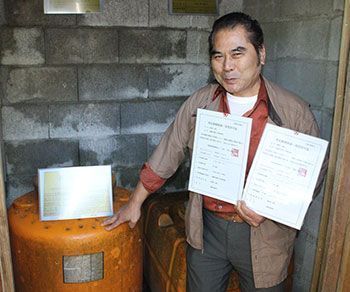Famous Habu-Hunter’s indictment for unlicensed snake keeping dismissed after proper documentation provided

Yasuhiro Makishi temporarily keeps vipers in a container and small room, a space which is secured with three locks. March 15, Nago Okinawa
March 16, 2017 Ryukyu Shimpo
Yasuhiro Makishi (60), the famous habu hunter who has been catching habu (a viper native to Okinawa) in the mountains of the northern part of Okinawa’s main island for around 30 years, had his arrest dismissed by the Tokyo District Court on March 10. Makishi had been arrested on March 1st in Mihara, Nago, along with a Tokyo business partner for charges of keeping animals without permission. The charges stemmed from an investigation that began in December of last year, where Makishi was suspected of raising himehabu, an animal designated as dangerous under Japanese law for fear of its ability to cause harm to people. Makishi denied these charges, stating that he was not raising the vipers. However, to make absolutely sure that he could continue to catch snakes, Makishi obtained a “Dangerous animal raising and keeping permit” for habu and himehabu from the Okinawa Animal Welfare and Management Center on January 27.
According to Makishi, an investigator from the police department came to his house for a total of four days over the course of December, and from March 1 through March 8, he was detained at the police department. Makishi denied the accusations, stating, “I sell all of the habu I catch that same day. I only keep them in my house for around 1-2 hours, and I think that an investigator must have seen one of them. I am not raising them.” Furthermore, he noted that it is common for everyday people to capture habu and hand them over to the local government, stressing, “If what happened here was a crime, then [the police] would need to arrest everyone.”
A spokesperson for the Ministry of the Environment’s Animal Welfare and Management Office explains that with regards to animals that require a permit to keep under animal welfare law, “When dealing with dangerous animals, steps have to be taken that they cannot escape under any circumstances.” As for the standards for raising, the spokesperson states, “The amount of time that is allowable is not clearly regulated, it is a gray area. It is not something that is tightly decided,” and that the governing body issuing the permits have flexibility with how they handle cases.
(Translated by T&CT and Sam Grieb)
Previous Article:US military generates largest amount of garbage yet: 2.6 tons, a 11% increase and 1.8 times that generated by Okinawans
Next Article:Asia’s biggest business meeting held in Okinawa to attract airline companies worldwide
[Similar Articles]
- Habu-hunter Makishi opens a photo exhibit
- Okinawa Rail’s eggs found in the belly of Habu snake
- Discarded dog becomes snake hunter
- Okinawan Police will not arrest the U.S. serviceman who trespassed and assaulted a teenage boy in Yomitan
- Okinawa Prefecture Issues Habu Alert, Cautioning Vacationers
 Webcam(Kokusai Street)
Webcam(Kokusai Street)


